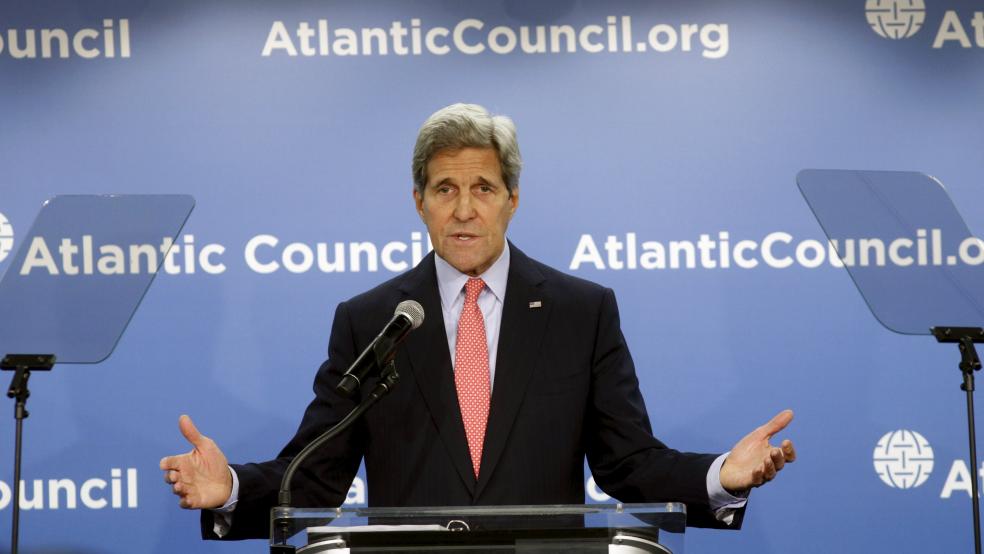Senate Foreign Relations Committee Chair Bob Corker (R-TN) promised to withhold his verdict on the U.S.-Iran nuclear deal until he had exhaustively reviewed the details and explored every facet of the agreement.
Yet he left little doubt about where he and his Republican colleagues will come down in the controversy when he greeted Secretary of State John F. Kerry, Energy Secretary Ernest Moniz and Treasury Secretary Jack Lew on Thursday with a snide remark that the U.S. and its allies had been taken to the cleaners by the Iranian negotiators.
Related: Obama Administration Takes Iran Nuclear Deal Fight Public
"Not unlike a hotel guest that leaves only with a hotel bathrobe on his back, I believe that you've been fleeced,” the folksy Tennessee Democrat opined.
It was open season on the complicated final agreement that emerged from Vienna a week ago in which Iran agreed to shelve much of its nuclear program for the next decade or so in return for the U.S. and the United Nations lifting onerous economic sanctions that have crippled Iran’s economy for years.
Corker said that he was “fairly depressed” by the closed-door briefing he and other lawmakers received on Wednesday on the details of the agreement, and that administration officials had engaged in “hyperbole” by saying the choice was “between this deal and war.”
Republicans, including Sens. Tom Cotton of Arkansas and Marco Rubio of Florida, a presidential candidate, made it clear that President Obama could not count on the GOP to help push through the deal. Some threaten that if a Republican manages to succeed Obama in the White House, the controversial nuclear non-proliferation agreement would be voided and U.S. sanctions would be slapped back on Tehran.
Related: Obama Turns to Corker to Sell His Iranian Nuke
“Survival of the agreement is not guaranteed beyond the term of the current president,” Rubio said. “And by the way, I personally hope that the next president is someone who will remove the national security waiver and re-impose the congressional sanctions passed by Congress, because the deal is fundamentally and irreparably flawed. I believe it weakens our national security and makes the world a more dangerous place.”
Kerry, a former chair of the Senate Foreign Relations Committee and the indefatigable chief U.S. negotiator of the agreement over the past two years, has much riding on getting the agreement through Congress by early this fall. He and President Obama are under no illusions they can win some – if any—Republicans as the drumbeat and conservative lobbying against the agreement intensifies.
“I am confident that the next president of the United States will have enough common sense that if this is being applied properly – if it is being implemented fully –they’re not just going to arbitrarily end it,” Kerry said.
Related: Rouhani Assures Critics Nuclear Deal Is Good for Iran
“The opportunity to negotiate [to call a halt to the Iranian’s development of a nuclear weapon] will not come along again,” he added. “We don’t lose anything here. The way we lose is by rejecting the deal…. If you think the Ayatollah is going to come back and negotiate again with us Americans, that’s fantasy.”
Under bipartisan legislation approved earlier this year, Congress has 60 days in which to review and vote on the agreement before Obama can begin lifting economic sanctions and implementing the terms of the deal. With the GOP in control of both the Senate and House, chances are good that Congress will pass a resolution of disapproval – one that Obama has repeatedly vowed to veto if it reaches his desk.
Congress could still override his veto, but it would take the votes of two-thirds of the members present and voting. In such a showdown, Obama would need the votes of at least a dozen Democrats in the Senate to sustain his veto.
Right now, with a handful of prominent Senate Democrats -- including Chuck Schumer of New York and Robert Menendez of New Jersey – either leaning against or outright opposing the agreement, building a Democratic firewall could be difficult. Senator Ben Cardin, the ranking Democrat on the Foreign Relations Committee and a bellwether of Democratic sentiment, said he has not yet decided how he would vote on the nuclear agreement with Iran but said he felt U.S. negotiators had made significant progress.
Related: Obama Administration Takes Iran Nuclear Deal Fight Public
"Our negotiators got an awful lot, particularly on the nuclear front," Cardin said at the hearing.
Cardin and other Jewish members of Congress are torn between their concerns about backing the president on arguably his most important foreign policy and national security initiative and their sympathy for the position of Israeli Prime Minister Benjamin Netanyahu, who has warned that the deal would be an historic blunder that would pave the way in the long term for Iran to develop a nuclear bomb and use it against Israel.
A small group of liberal House Democrats, including Rep. Keith Ellison of Minnesota, has already signaled support for Obama on the agreement. However, a group of 18 Jewish House Democrats is emerging as a key voting bloc, and they are being aggressively lobbied by pro and anti-agreement forces. Senior House Democrats told Politico yesterday they are confident they will have the votes to sustain a presidential veto, and pointed to letters signed by 152 Democrats earlier this year supporting the initial framework of the nuclear deal.
If Congress rejects the agreement, Kerry said, it would amount to “a great big green light for Iran to double the pace of its uranium enrichment, proceed full speed ahead with a heavy water reactor, install new and more efficient centrifuges, and do it all without the unprecedented inspection and transparency measures that we have secured.”
“Everything we have prevented would then start taking place,” he said.





